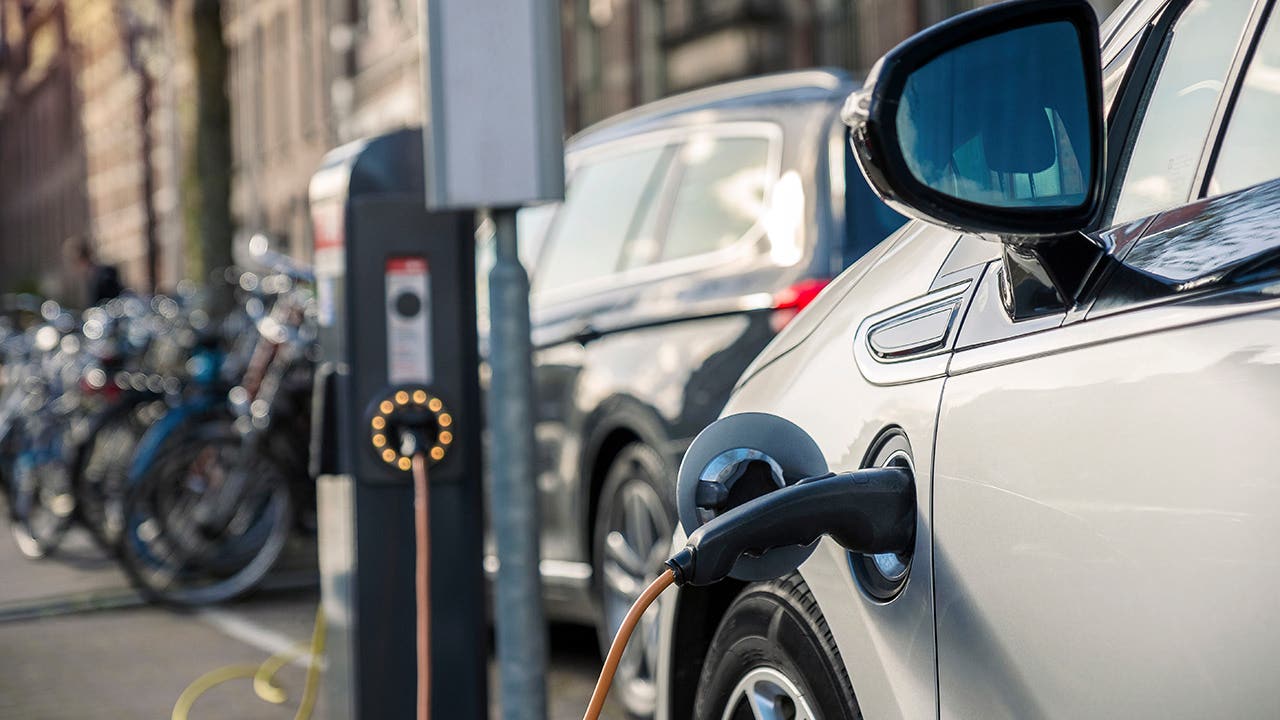Gas vs. electric vehicles: Which is cheaper to own?

With over a dozen states agreeing to ban the sale of new gas-powered vehicles after 2035, drivers are pondering the gas vs. electric dilemma. Many drivers like the idea of reducing their carbon footprint, but have concerns about cost and range. Between insurance premiums, maintenance and electric bills, there is a lot to consider. The best car for you is ultimately the one that suits your lifestyle, but this guide can help you decide if an EV would be the right fit for your budget.
The cost of going green: EV vs. gas car prices
When you begin your search for your first electric car, you’ll need to wrap your head around some new concepts. Rather than looking at the miles per gallon, you’ll be more likely to be researching the range of your EV per charge. One commonly used statistic is miles per gallon of gasoline equivalent, or MPGe. Another way to determine efficiency is through the cost per kilowatt hour (kWh), which is likely to be higher at a public charging station than it will be if you charge your vehicle at home.
Another cost you will want to consider is your car insurance rate. No matter what type of car you drive, you will need coverage in almost all of the U.S. At the current time, car insurance for electric vehicles tends to be slightly more expensive than for gas-powered cars, but this may change as EVs become more common and repair costs drop.
The chart below is designed to help you understand the costs involved in owning and using EVs and gas vehicles. We’ve included the range or mileage of each one, as well as the average cost of car insurance. Keep in mind that car insurance is a highly individualized product, and your rate is likely to differ from the averages.
Incentives and rebates
With the purchase price of electric vehicles generally higher than gas-powered vehicles, many drivers rely on the federal tax credit to make electric car purchases more affordable. As of now, these incentives are still intact, but drivers looking to purchase an electric car in the near future may want to keep an eye on President Trump’s executive order, Unleashing American Energy. Along with eliminating the electric vehicle mandate, this order states “considering the elimination of unfair subsidies and other ill-conceived government-imposed market distortions that favor EVs over other technologies” as a way to “promote true consumer choice.”
While the maximum credit amount is $7,500, the actual amount will vary depending on the battery’s capacity and other stipulations. Keep in mind that every car manufacturer has a limit on these credits, and they change all the time. A current list of eligible vehicles and the maximum credit amounts can be found through the U.S. Department of Energy. Below is a basic breakdown of the current tax incentive guidelines:
- Vehicles that meet both the critical mineral and battery component requirements are eligible for the total tax credit of $7,500. Cars only meeting one of the requirements may be eligible for a $3,750 tax credit.
- Vans, SUVs and pick-up trucks can’t have an MSRP exceeding $80,000 for tax credit eligibility.
- Sedans have an MSRP cap of $55,000 for tax credit eligibility.
- Drivers must also meet adjusted gross income thresholds, which are as follows:
- $300,000 and below for joint filers
- $225,000 and below for head-of-household filers
- $150,000 and below for all other filers
State and local incentives for purchasing an electric vehicle exist, as well. The National Conference of State Legislatures provides details on all the different incentives in each state for electric vehicle buyers. Some benefits and extra incentives include rebates on home energy costs, help with financing home charger installations, HOV lane exemptions with appropriate vehicle tags and more. Some electric utility companies also offer rebates and incentives for owning and charging an electric vehicle at home.
When it comes to buying a new electric vehicle, there are also unique financing options available. Green auto loans tailored specifically for electric and fuel-efficient vehicles take into account the higher purchase price of these vehicles by offering buyers extra benefits. This could include lower interest rates and longer repayment terms, making the monthly payment more affordable.
Are EVs cheaper than gas?
A major factor to think through when considering an electric vehicle is the cost of charging an EV compared to filling a car up with gas. Charging an EV at home with a Level 2 charger can cost between $0.12 to $0.24 per kWh, which translates to roughly $6 to $18, depending on the size of your battery, for a full charge that can typically go 200-plus miles.
This is considerably cheaper than gas for most drivers. Using public fast chargers costs more, averaging around $0.30 or more per kWh, with a full charge totaling $20-$40. While more expensive than home charging, this is still likely cheaper than a comparable gas fill-up for over 200 miles of range. Overall, EV drivers will typically spend less on electricity than gas, saving money in the long run, especially with home charging.
| Cost to refuel or recharge | Miles traveled | Total cost for 200 mi |
|---|---|---|
| $3.77 per gallon of gas | 200 miles @ 24.9 MPG | 8 gallons of gas = $30.16 |
| $6–$18 for regular charging | 200+ miles | 1 charge = $6–$18 |
| $20–$40 for fast charging | 200+ miles | 1 charge = $20–$40 |
Hidden costs of an electric vehicle
You might have made plans to buy or finance your new electric car and have an estimate of what your car insurance premium might be, but the costs of an electric vehicle don’t end there. Here are some of the hidden costs that can come with owning an electric vehicle.
Depreciation of electric vehicles
Within its first year, a brand-new car’s value can depreciate up to 20 percent or even more. For an electric car, this can be even greater, depending on how quickly technology has improved. Newer cars could have longer range and improved battery life, making older models obsolete.
The car’s make and model matter, too. A comparison by CarEdge found that, after five years, a Tesla Model 3 maintained around 48 percent of its resale value, while a Nissan Leaf only maintained 34 percent. A Toyota Camry, on the other hand, maintained 65 percent of its resale value.
Battery degradation in electric vehicles
When it comes to electric vehicles, there’s another problem car owners can run into as the car gets older: battery degradation. A gas-powered car’s tank doesn’t get smaller as it gets older, but as an electric car ages, its battery range dwindles, decreasing the maximum amount of miles you can drive before it needs to be recharged. While many factors can impact battery lifespan, from improper charging to cold weather conditions, it’s unavoidable that an electric vehicle’s battery will not always have the same range as it did when it was new. And, just like with the battery on a gas-powered vehicle, you will eventually have to replace it. More on that expense in a moment.
Maintenance for electric vehicles
All-electric vehicles have fewer moving parts compared to gas-powered vehicles, which may lead to the assumption that they are cheaper to maintain. In some respects, this is true — electric vehicles don’t require oil changes or regular tuneups, and because of regenerative braking, brake systems may also last longer. Further, a study by AAA found that it only costs an estimated $949 annually to service an electric car versus $1,279 for a gas vehicle.
Instead, one of the largest costs associated with electric vehicles may be its eventual battery replacement. Those buying a brand-new EV may not need to worry about this for several years, but those wanting to go the pre-owned route may see this cost come up sooner rather than later. Green Cars estimates that the average cost of replacing the battery is between $5,000 to $20,000 even before labor. Green Cars replacement battery estimates for a few popular electric cars are as follows:
- Nissan Leaf: $6,200
- Chevy Bolt: $16,000
- BMWi3: $13,500
- Tesla Model 3: $16,000
However, it can help to know that modern batteries can last up to 10 years or more, depending on the car itself, how it’s driven, how it’s charged and more. Additionally, Green Cars reports that many automakers have an eight- to 10-year or 100,000-mile warranty on their electric car batteries.
Charging electric vehicles
How to charge an electric vehicle may be the first concern of any prospective electric vehicle owner. Fully charging an electric car could take anywhere from 30 minutes to a few hours, and whether you charge at home or at a public charging station, there may be higher rates during peak hours. For those who rent or live in a townhouse or condominium where installing an at-home charger isn’t feasible, owning an electric vehicle comes with more challenges for this reason.
But if you’re able to charge from home, installing an EV charger is convenient — although it does add another cost to your EV ownership. You’ll typically need to purchase a separate charger and hire an electrician to retrofit your home. Additionally, you’ll want to do a calculation to accurately estimate the total cost for your electric vehicle to see if it offsets the cost of fueling your current car. The first step starts with knowing how much your electricity costs per kilowatt during peak and off-peak hours. As mentioned earlier, some electric utility companies do offer incentives and rebates for EV owners who charge their vehicles at home, so you may want to check with your electricity company to see if any cost savings are available.
Charging at home with our EV station costs about $30-$40 per month in electricity, compared to the $150-$200 per month we used to spend on gas. We were also fortunate to have a friend install our Level 2 charger for free, so we avoided the typical $500-$700 installation cost.
— Daniella Ramirez Bankrate editor
Tools to help you calculate the cost of owning an electric vehicle
Part of buying an electric vehicle is taking the time to understand whether or not it fits your needs and lifestyle. Before you decide to make a switch, here are some resources to help you calculate the cost of owning an electric vehicle:
- FuelEconomy.gov: Created by the Environmental Protection Agency, this website allows you to compare up to four vehicles based on EPA fuel economy, annual fuel cost, tank cost, tank size and more.
- Alternative Fuels Vehicle Cost Calculator: This tool, created by the U.S. Department of Energy, helps drivers compare up to eight vehicles and takes into consideration how the vehicle will be used, such as the average daily driving distance and types of roads the vehicle will be most commonly driven on.
- Carbon Counter: MIT’s Carbon Counter is useful for drivers who want to see what their carbon output might be depending on the car they choose to drive.
Should you buy an electric vehicle?
There are a number of good motivations for purchasing or leasing an EV: the lower carbon footprint, the potential to save money and more. In some places in the U.S., such as California, for example, there are even movements toward restricting the sale of gas-powered vehicles, meaning electric cars may be your only option in the future. Whether the time is right for you to purchase one, however, is a personal decision, and you will want to base it on your own situation. If you live in a rural area with little opportunity to access public charging stations, for example, it might be best to wait. The higher initial cost of many EVs may make them out of your reach, as well.
If you decide against an EV, you still have options, of course. There are a number of reasonably priced gas-powered and hybrid vehicles that can be insured for a fairly low cost and don’t cost much to run.
Methodology
Bankrate utilizes Quadrant Information Services to analyze February 2023 rates for all ZIP codes and carriers in all 50 states and Washington, D.C. Quoted rates are based on a 40-year-old male and female driver with a clean driving record, good credit and the following full coverage limits:
- $100,000 bodily injury liability per person
- $300,000 bodily injury liability per accident
- $50,000 property damage liability per accident
- $100,000 uninsured motorist bodily injury per person
- $300,000 uninsured motorist bodily injury per accident
- $500 collision deductible
- $500 comprehensive deductible
To determine minimum coverage limits, Bankrate used minimum coverage that meets each state’s requirements. Our base profile drivers commute five days a week, drive 12,000 miles annually and own a 2023 model year of one of the following vehicles:
- Chevy Bolt
- Ford F-150
- Honda Civic
- Nissan Altima
- Nissan Leaf
- Tesla Model S plaid
- Tesla Model X
- Tesla Model 3
- Toyota Camry
- Toyota Prius
These are sample rates and should only be used for comparative purposes.
Why we ask for feedback Your feedback helps us improve our content and services. It takes less than a minute to complete.
Your responses are anonymous and will only be used for improving our website.
You may also like

Buying a house with cash vs. a mortgage

Pros and cons of leasing vs. buying a car

Buying an electric car could save you money



